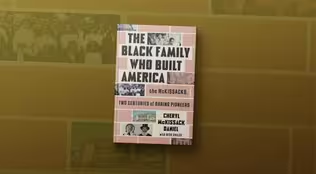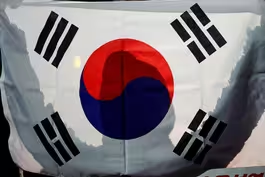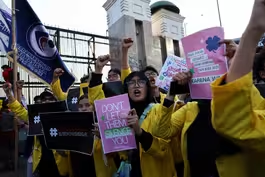
Chicago braces for federal crackdown as Trump stokes tension
Clip: 9/7/2025 | 6m 35sVideo has Closed Captions
Chicago braces for federal crackdown as Trump stokes tensions on social media
Tensions are rising in Chicago as Trump signals that he’ll soon send troops and ICE agents to the city as part of his crackdown on crime and illegal immigration. This weekend, he posted on Truth Social, “Chicago about to find out why it’s called the Department of WAR.” Brandis Friedman, anchor of Chicago Tonight on PBS member station WTTW, joins John Yang to discuss how residents are reacting.
Problems playing video? | Closed Captioning Feedback
Problems playing video? | Closed Captioning Feedback
Major corporate funding for the PBS News Hour is provided by BDO, BNSF, Consumer Cellular, American Cruise Lines, and Raymond James. Funding for the PBS NewsHour Weekend is provided by...

Chicago braces for federal crackdown as Trump stokes tension
Clip: 9/7/2025 | 6m 35sVideo has Closed Captions
Tensions are rising in Chicago as Trump signals that he’ll soon send troops and ICE agents to the city as part of his crackdown on crime and illegal immigration. This weekend, he posted on Truth Social, “Chicago about to find out why it’s called the Department of WAR.” Brandis Friedman, anchor of Chicago Tonight on PBS member station WTTW, joins John Yang to discuss how residents are reacting.
Problems playing video? | Closed Captioning Feedback
How to Watch PBS News Hour
PBS News Hour is available to stream on pbs.org and the free PBS App, available on iPhone, Apple TV, Android TV, Android smartphones, Amazon Fire TV, Amazon Fire Tablet, Roku, Samsung Smart TV, and Vizio.
Providing Support for PBS.org
Learn Moreabout PBS online sponsorshipJOHN YANG: Good evening.
I'm John Yang.
Tensions are rising in Chicago as President Trump signals that he'll soon send troops and ICE agents to the city as part of his crackdown on crime and illegal immigration.
This weekend he posted on Truth Social Chicago is about to find out why it's called the Department of War.
Leaving the White House today, he rattled off some numbers.
DONALD TRUMP, U.S. President: You know how many people were killed in Chicago last week?
You know how many people were killed in Chicago the week before?
Seven.
You know how many people were wounded?
74 people were wounded.
You think there's worse than that?
I don't think so.
JOHN YANG: Numbers from the Chicago Police Department show that through the end of August, murders were down 31 percent from the same period in 2024.
Brandis Friedman is anchor of Chicago Tonight on member station WTTW.
Brandis, all this attention on social media, especially he's calling this chipocalypse.
Now, how are people reacting or how are people feeling about this in Chicago?
BRANDIS FRIEDMAN, WTTW News: So this weekend we've seen a number of people take to the streets, thousands and thousands of demonstrators.
I think just yesterday they stopped by the ICE Chicago Field Office as well as the federal courthouse, Trump Tower, protesting what they're hearing from the president.
I think their intention is to send him a message that they won't tolerate what they believe to be sort of fear mongering.
We know that the president has been making these threats for a couple of weeks.
On social Media, we see Governor J.B. Pritzker saying that, you know, that this is not normal and saying that it is the president basically declaring war on an American city and that it should not be tolerated.
And something similar from Mayor Brandon Johnson of Chicago as well.
JOHN YANG: I know this weekend, big Chicago celebration among the Mexican American community, Mexican Independence Day.
Is there fear among the immigrant community?
BRANDIS FRIEDMAN: I think so, yes.
I think it is safe to say, yes, there is some fear.
The Mexican Independence Day parade in Pilsen, the Pilsen neighborhood, it did step off yesterday, but with noticeably fewer people.
I think there are certainly some people who are fearful of coming out, fearful of those events being like, you know, I hate to use this kind of metaphor, but, like, sort of shooting fish in a barrel, right?
Making it an easy target for ICE agents to round up people who may be undocumented.
Another festival that's supposed to take place next weekend, the El Grito Festival, which is supposed to happen in downtown Grant Park, that one has already been canceled because you're also hearing from some folks say, you know, we are still going to celebrate our culture and our heritage and not going to allow what's happening to sort of steal that joy from us.
But, you know, I also heard someone else say that right now this is not a good time for the Mexican American community, that they are being targeted by the American government and that there's nothing to celebrate right now, that they should be sort of hunkered, hunkering down and taking care of themselves and each other.
JOHN YANG: You know, another reason why the president is focusing on Chicago is that it's a sanctuary city.
And Tom Holman, the border czar, had this to say about sanctuary cities on CNN's State of the Union today.
ATOM HOMAN, White House Border Czar: You can expect action in most sanctuary cities across the country.
President Trump's prioritized sanctuary cities because sanctuary cities knowingly release illegal alien public safety threats to the streets every day.
That's where the problem is.
JOHN YANG: Has the police said whether or not they're going to cooperate with the ICE agents when they get there?
BRANDIS FRIEDMAN: The police department and the mayor have said they will not cooperate, they will not support these efforts, but they will not hinder them.
Right.
So what Superintendent Snelling has said here in Chicago is that if they are called, they will first send a more senior officer to that scene and make a determination of what's happening.
Right.
And whether or not it warrants Chicago police officers to be on the scene as a matter of public safety and sort of protecting anything from getting out of hand and to enforce municipal code or municipal laws.
But they will certainly not be lending a hand to the ICE agents who are on the ground.
JOHN YANG: And what about the Chicago public schools?
Have they said anything about if agents were to come even in the vicinity of a school?
BRANDIS FRIEDMAN: They have.
I think the big conversation for Chicago Public Schools has been whether or not they should shift to remote learning in the interest of protecting students who are undocumented, protecting them from agents.
You know, as a sanctuary city, the district tends to be in lockstep with the mayor on the issue of immigration and protecting students and not allowing ICE agents to come to their schools for ICE enforcement, for immigration enforcement.
JOHN YANG: I know we talked about Governor Pritzker.
He said that he'll go to court if the - - if troops arrive in Chicago.
Has the mayor said anything about what sort of action he would take?
BRANDIS FRIEDMAN: The mayor has not.
I think he's sort of leaning on the state for this one.
Right.
Like, so we're hearing a lot more from Illinois Attorney General Kwame Raul.
Kind of waiting to see what laws the president or, you know, what method the president should take to do what he's planning on doing.
Right.
Starting with ICE agents and then eventually the National Guard, if it becomes necessary, and then taking them to court.
Nothing necessarily legal action that the mayor has stated.
But obviously, this is one place where the mayor and the governor are in total agreement with regards to resisting what it is the Trump administration is attempting to do.
JOHN YANG: Trump has long been talking about Chicago in the 2016 presidential campaign.
I remember he was always talking about Chicago crime and about how he could clean it up.
And he also phrased it as a sort of reaching out to the black community in Chicago by talking about that it would help them.
Why do you think he talks about Chicago so much?
BRANDIS FRIEDMAN: I think a lot of Chicagoans would like to know that, why he is often, you know, why we often hear him talking about Chicago the way that he does.
And, you know, with regards to the crime issue, there are black and brown communities that are feeling the effects of crime much more regularly than other parts of the city of Chicago.
So that's not to say that there is not a problem, but the problem is certain.
I think you'll hear this from, you know, from local leaders.
The problem is certainly much better than it is or than it was, than it has been.
It has definitely been worse than it is right now.
That does not mean it's okay.
And certainly there is that there is work to be done.
But why he is always -- why he's attracted to talking about Chicago the way he does, I could not tell you.
JOHN YANG: Brandis Friedman from Chicago tonight at WTTW, thank you very much.
BRANDIS FRIEDMAN: Thanks, John.
New book chronicles design legacy of the McKissack family
Video has Closed Captions
Clip: 9/7/2025 | 6m 21s | ‘The Black Family Who Built America’ chronicles the McKissacks’ design legacy (6m 21s)
News Wrap: South Korea, U.S. reach deal to release workers
Video has Closed Captions
Clip: 9/7/2025 | 3m 3s | News Wrap: South Korea negotiates release of workers detained in U.S. raid (3m 3s)
Why violent protests are sweeping across Indonesia
Video has Closed Captions
Clip: 9/7/2025 | 6m 54s | Violence sweeps across Indonesia amid protests over worsening economy (6m 54s)
Providing Support for PBS.org
Learn Moreabout PBS online sponsorship
- News and Public Affairs

FRONTLINE is investigative journalism that questions, explains and changes our world.

- News and Public Affairs

Amanpour and Company features conversations with leaders and decision makers.












Support for PBS provided by:
Major corporate funding for the PBS News Hour is provided by BDO, BNSF, Consumer Cellular, American Cruise Lines, and Raymond James. Funding for the PBS NewsHour Weekend is provided by...


